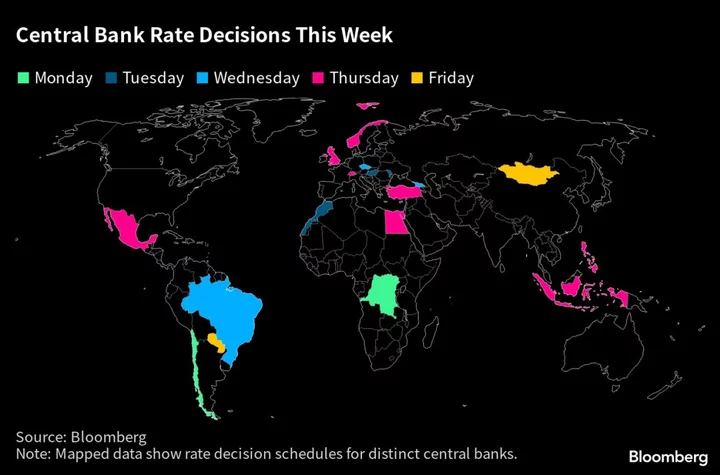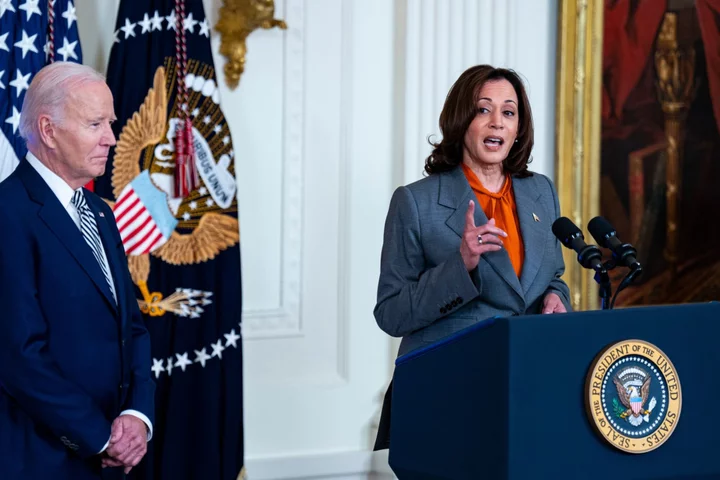Stocks in Asia were broadly higher in choppy trading as the House passed a deal to avert US default and investors weighed the prospect of a pause in rate hikes from the Federal Reserve this month.
Japanese and Australian shares rose Thursday as those in South Korea edged lower. US equity futures traded in and out of positive territory after an initial boost following news of the deal passing the House.
Benchmarks in China climbed, helped along by Caixin manufacturing data on Thursday that showed an expansion in activity, exceeding forecasts of a small contraction. The numbers followed official figures Wednesday that showed a further contraction in activity, weighing on the country’s equity markets.
For the Chinese economy “things are not getting worse outside of the growth momentum — but it’s not getting better,” Wendy Liu, chief Asia and China equity strategist for JPMorgan Chase & Co., said in an interview with Bloomberg Television. However, the economy will be “firmly in recovery in the second half,” she added.
The mixed picture for US futures suggests investors were taking more notice of Fed officials who backed the possibility of holding rates unchanged the next meeting.
Fed Governor Philip Jefferson said the central bank is inclined to keep interest rates steady in June to assess the economic outlook. His remarks were echoed by Philadelphia Fed President Patrick Harker, who said, “I think we can take a bit of a skip for a meeting.”
The S&P 500 closed 0.6% lower Wednesday, clinging to a small gain for May that marked three consecutive monthly advances. The Nasdaq 100 index fell 0.7%, weighed by a decline in Nvidia Corp. shares after a rapid rally that has nearly tripled the stock price this year.
Corporate earnings were again in focus. Shares in Salesforce Inc. tumbled around 6% in after-hours trading following a dim outlook for sales while Hewlett Packard Enterprise Co. fell 7.1% Wednesday on slimmer revenue projections than anticipated.
Treasuries sold off, largely reversing a Wednesday rally. Australian bond yields were moderately higher while those for New Zealand fell slightly. The dollar was in a tight range against most major currencies.
Hopes for a Fed pause were partly pared back after the JOLTS jobs report for April showed more than 10 million openings, the highest in three months and above consensus estimates.
Passage of the deal struck by House Speaker Kevin McCarthy and President Joe Biden means the bill will be sent to the Senate days before the June 5 default deadline.
Elsewhere, West Texas Intermediate and Brent crude futures rose after two days of declines. Gold was flat.
Key events this week:
- Eurozone HCOB Eurozone Manufacturing PMI, CPI, unemployment, Thursday
- US construction spending, initial jobless claims, ISM Manufacturing, Thursday
- ECB President Christine Lagarde speaks at conference, Thursday
- Fed’s Patrick Harker speaks at webinar, Thursday
- US unemployment, nonfarm payrolls, Friday
Some of the main moves in markets:
Stocks
- S&P 500 futures were little changed as of 11:55 a.m. Tokyo time. The S&P 500 fell 0.6%
- Nasdaq 100 futures fell 0.2%. The Nasdaq 100 fell 0.7%
- Japan’s Topix rose 0.4%
- Australia’s S&P/ASX 200 rose 0.2%
- Hong Kong’s Hang Seng rose 0.7%
- The Shanghai Composite rose 0.4%
- Euro Stoxx 50 futures rose 0.7%
Currencies
- The Bloomberg Dollar Spot Index was little changed
- The euro was unchanged at $1.0689
- The Japanese yen was little changed at 139.47 per dollar
- The offshore yuan was little changed at 7.1123 per dollar
Cryptocurrencies
- Bitcoin fell 1.5% to $26,715
- Ether fell 0.6% to $1,854.14
Bonds
- The yield on 10-year Treasuries advanced two basis points to 3.66%
- Australia’s 10-year yield advanced one basis point to 3.62%
Commodities
- West Texas Intermediate crude rose 0.6% to $68.47 a barrel
- Spot gold was little changed
This story was produced with the assistance of Bloomberg Automation.
--With assistance from Joanna Ossinger.









